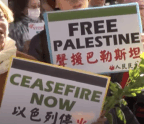Correspondence between Arundhati Roy and Shahidul Alam shares resilience and hope

Shahidul Alam (left) and Arundhati Roy (right). Image from Flickr by Christopher Michel and UCL News. CC BY and CC BY-NC-ND.
On November 14, 2018, a day before the PEN International's Day of the Imprisoned Writer, Indian author Arundhati Roy wrote a letter to the award-winning Bangladeshi photojournalist Shahidul Alam, following the completion of the 100th day of his incarceration. Shahidul Alam was subsequently released on bail and had written back another letter to Roy in response. Both of these were published as open-letters and have since been widely publicized, with numerous media outlets featuring them on the opinion sections of their news coverage.
Shahidul Alam, an eminent photographer, social activist, and teacher from Bangladesh had been picked up by at least 20 officers from his home in Dhaka at about 10 AM on August 5, 2018, hours after his interview with Al Jazeera had been broadcasted. The next day he was charged under Section 57 of Bangladesh's Information Communications Technology Act for making ‘provocative’ comments against the country's government on the subject of the student protest for road safety, which lasted from July 29 to August 9. His counsels submitted a bail petition on August 28 but he was denied a few times and a long legal battle ensued while his supporters all over the world demanded his release.
It is one hundred days since the award-winning photojournalist Shahidul Alam was arrested without a warrant. A group of South Asian writers and activists here urge Sheikh Hasina and Bangladesh Government to release him immediately:https://t.co/2KMHhKPDrw
— Ramachandra Guha (@Ram_Guha) November 13, 2018
Following Arundhati's letter, 34 prominent South Asians, including writers, historians and actors signed a letter to Prime Minister Sheikh Hasina calling for the unconditional release of Shahidul Alam.
The arrest also sparked outrage among supporters who then organized numerous protests, solidarity rallies and online campaigns demanding the justice be served. The Shahbag Square in Dhaka swelled with people chanting slogans as a public gathering titled “Let democracy be free” was held on September 9, in protest of the imprisonment of Shahidul.

“Let Democracy be free”. An innovative protest in Shahbag Square in Dhaka, demanding the release of Shahidul Alam. Image by Pranabesh Das, used with permission.
Arundhati Roy mentioned in the letter her deep concern for Shahidul, having feared the worst when news channels first broadcasted the details of his arrest. She also expressed her strong disapproval and anger towards the ICT laws of the country. Arundhati wrote:
Section 57 potentially criminalizes all forms of speech except blatant sycophancy. It is an attack not on intellectuals but on intelligence itself.
After spending months behind the bars, Shahidul was released on November 20, 2018, five days after the High Court granted him permanent bail. Although the charges are still held against him, he cannot be imprisoned without a court order.
Iconic shot of Bangladeshi photojournalist and rights activist Shahidul Alam, shared by the #FreeShahidul campaign. He finally got bail today after more than 100 days in prison, accused of spreading propaganda. He was arrested after posting on Facebook about protests in Dhaka. pic.twitter.com/tgg87ODfgn
— Poppy McPherson (@poppymcp) November 15, 2018
Shahidul wrote in his letter to Arundhati that despite the tremendous efforts that were made to prevent his release, victory was still on his side. “…we held hands and sang songs as I left the jail gate,” inscribed Shahidul.
In his response, Shahidul Alam highlighted that what made the letter from Arundhati special was that, unlike other letters sent to the Prime Minister which called for his freedom, this had been addressed to him in particular.
He describes his encounter with different people, emotions caused by living away from the comfort of his home, his goldfish and his wife Rahnuma, and his experience of the jail routine. He also writes about the collective grief, legacies, and struggles that he and Roy both share.
As Arundhati had concluded her letter yearning to witness better days, Shahidul sent an assurance on his, with lots of hope:
But yes, Arundhati, the tide will turn, and the nameless, faceless people will rise. They will rise as they did in 1971. We will have secularism. We will have democracy. We will have social equality. We will win back this land.
Supporters worldwide shared and retweeted the letters, a token of Shahidul and Arundhati’s comradeship and mutual appreciation of each other’s work.
Amal Nassar, a permanent representative to the ICC of FIDH, tweeted:
“the tide will turn, and the nameless, faceless people will rise. They will rise against the entire state machinery”.
A beautiful letter from Shahidul Alam to
Arundhati Roy with reflections on his time in prison, from which he was released in Nov. 2018. https://t.co/CK4UPhoeuJ— Amal Nassar (@AmalNassar_) January 12, 2019
Arabindu Deb Burma from Tripura, India tweeted:
The life of Tripuris in India is no different from that of Bangladesh. We are on the same situation now suppressed and oppresses yet we leaved in so called democratic country. https://t.co/HomevSFUVD
— arabindudebburma (@arabindu) January 12, 2019
Bangladeshi American poet Thahitun Marium said:
I really enjoyed this exchange, especially him writing about people he met in the jail who reminds him of characters from Arundhati’s book. Shahidul is a beautiful soul.
— Thahitun Mariam (@thahitun) January 9, 2019
Australian activist Tasneem Chopra tweeted:
This brought me to tears. Utterly raw. https://t.co/6v979nyO9Y
— Tasneem Chopra (@TasChop) January 13, 2019
As more and more Bangladeshi journalists are self-censoring themselves out of fear of repression, Shahidul's words should encourage them to carry on:
The case against Shahidul still hangs over my head and the threat of bail being withdrawn is the threat they hope will silence my tongue, my pen, and my camera. But the ink in our pens still runs.
Originally published in Global Voices.






